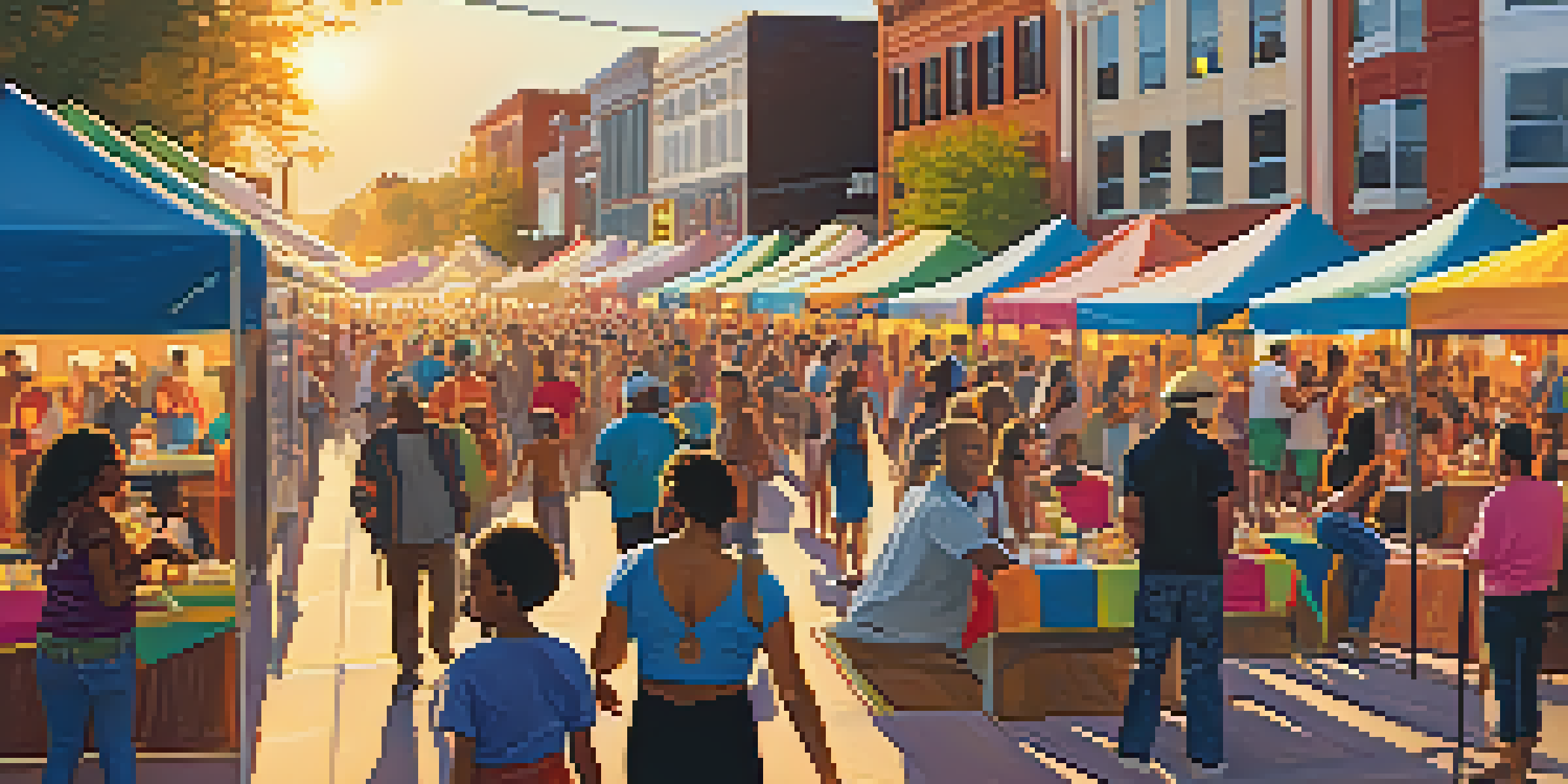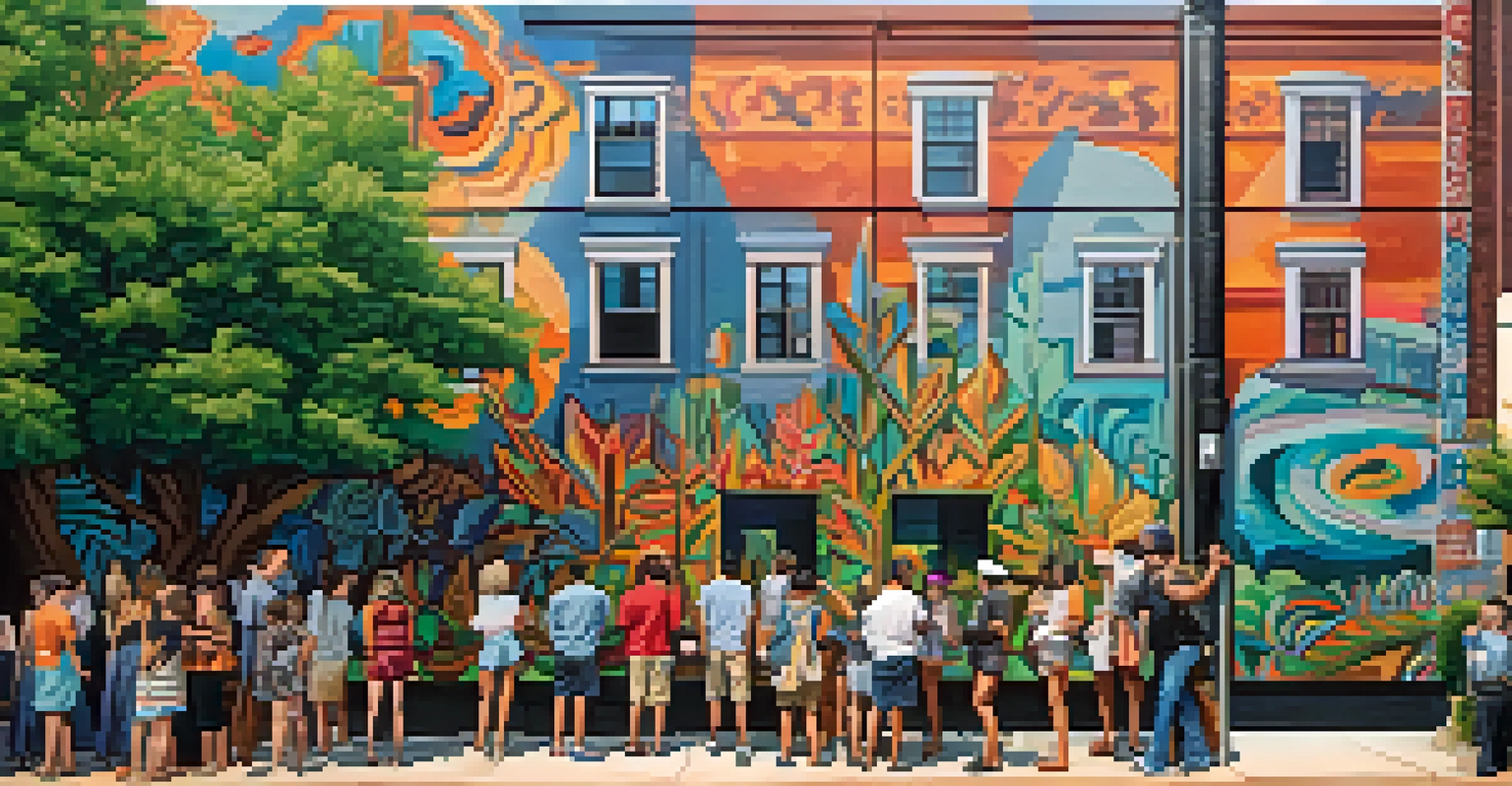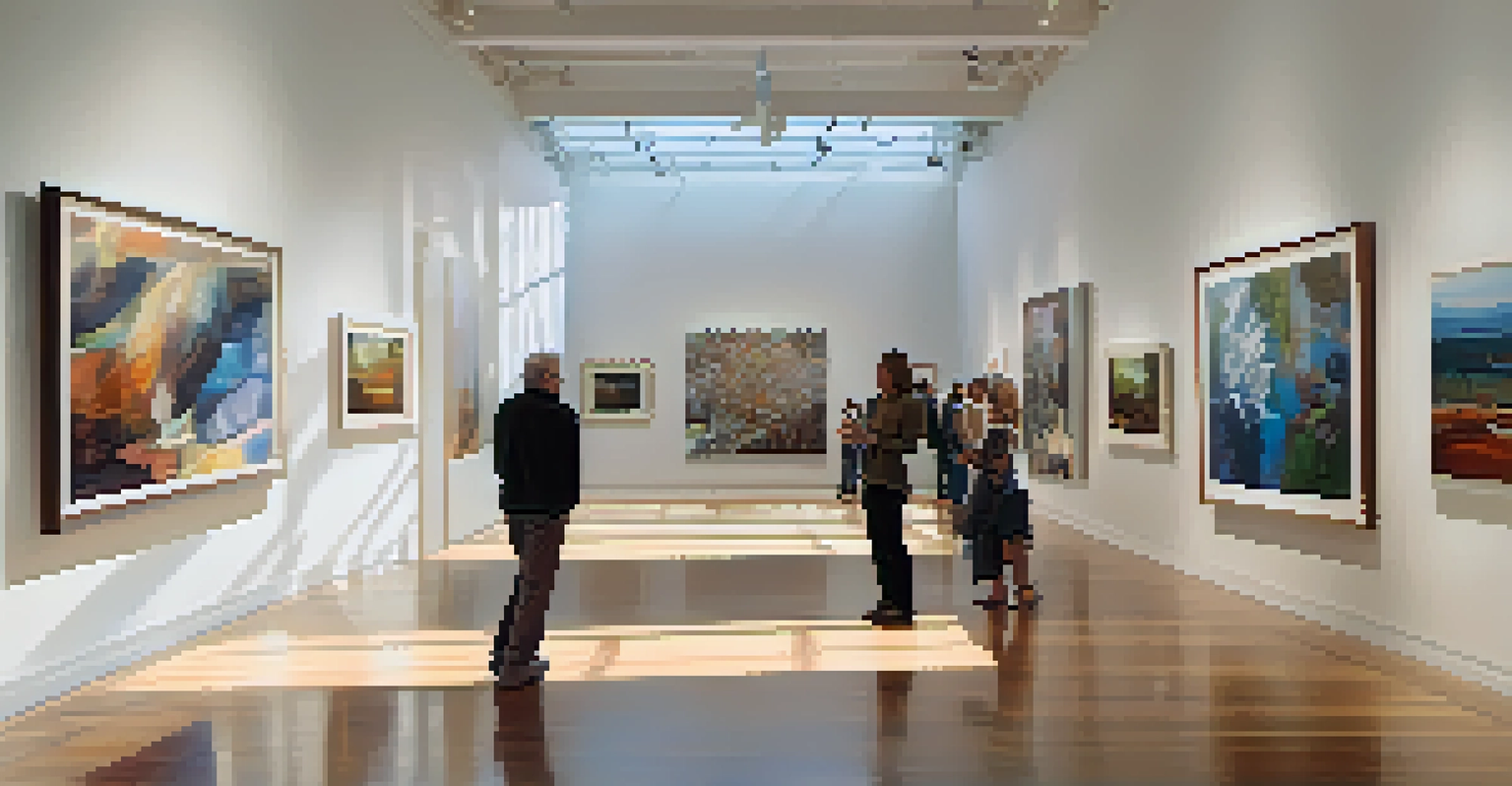Cultural Evolution: Arts and Music in Charlotte's History

The Roots of Charlotte's Artistic Tradition
Charlotte's artistic tradition has deep roots, dating back to its founding in the 18th century. Initially, the city was a hub for trade and agriculture, but the arts began to flourish as the population grew. Early settlers brought various cultural influences, which laid the groundwork for a vibrant artistic community. This foundation set the stage for the arts to evolve alongside the city's development.
Art is not what you see, but what you make others see.
As the city expanded, so did its cultural offerings. The establishment of institutions like the Mint Museum in 1936 marked a significant milestone for visual arts in Charlotte. This museum not only showcased local artists but also introduced residents to a broader spectrum of artistic expression. Over the decades, Charlotte has continued to embrace its heritage while welcoming new artistic movements.
The combination of history and innovation has made Charlotte a melting pot for diverse artistic styles. From the traditional crafts of the early settlers to contemporary installations, the city reflects a unique blend of past and present. This rich tapestry of artistic tradition helps shape Charlotte's identity, making it a vibrant place for both artists and audiences alike.
The Evolution of Music in Charlotte
Music has always been an integral part of Charlotte's cultural fabric. In its early days, folk music echoed through the streets, with communities gathering to share their stories through song. As the city grew, so did its musical landscape, evolving into a rich tapestry that includes gospel, blues, and jazz. Each genre has left a distinct mark on the city's sound and cultural identity.

The mid-20th century saw the rise of more diverse musical genres, with local musicians gaining national recognition. Festivals such as the Charlotte Jazz Festival and the Carolina Renaissance Festival highlighted the city’s vibrant music scene, attracting artists and audiences from all over. These events not only showcased established artists but also provided a platform for emerging talent to shine.
Charlotte's Rich Artistic Roots
The city's artistic tradition has evolved from its 18th-century origins, influenced by diverse cultural backgrounds and historical events.
Today, Charlotte's music scene continues to thrive, embracing everything from hip-hop to indie rock. Venues like The Fillmore and the Neighborhood Theatre host a range of performances, contributing to the city's reputation as a musical destination. As Charlotte evolves, its music remains a vital expression of community and creativity, reflecting the diverse voices that call the city home.
Influence of Local Artists on Charlotte's Culture
Local artists have played a crucial role in shaping Charlotte's cultural landscape. Their creativity and passion not only enrich the community but also inspire future generations. Many artists draw inspiration from Charlotte's history, using their work to tell stories that resonate with both locals and visitors. This connection between art and community is essential for fostering a thriving cultural environment.
The future belongs to those who believe in the beauty of their dreams.
The rise of public art projects, such as murals and installations, has further highlighted the talent within the city. These projects not only beautify urban spaces but also serve as a canvas for social commentary and community engagement. Local artists often collaborate with community organizations to create works that reflect the values and aspirations of the neighborhoods they inhabit.
As Charlotte continues to grow, the influence of its local artists remains strong. Their contributions not only enhance the city’s aesthetic appeal but also promote cultural dialogue and understanding. By supporting local talent, Charlotte cultivates a vibrant arts scene that celebrates diversity and encourages creativity across all disciplines.
The Role of Institutions in Cultural Development
Institutions have been instrumental in supporting and promoting the arts in Charlotte. Organizations like the Arts & Science Council and the North Carolina Dance Theatre provide essential resources for artists and cultural organizations. These institutions help bridge the gap between artists and the community, fostering collaboration and enhancing access to the arts. Their efforts ensure that the cultural landscape remains dynamic and inclusive.
Moreover, educational institutions contribute significantly to the cultural evolution of Charlotte. Schools and universities offer art and music programs that nurture young talent and encourage creative expression. By providing students with opportunities to engage with the arts, these institutions help cultivate the next generation of artists and cultural leaders in the community.
Local Artists Shape Culture
Local artists play a vital role in enhancing Charlotte's cultural landscape through community engagement and public art projects.
The collaborative efforts of these institutions play a vital role in sustaining Charlotte's vibrant arts scene. They create an ecosystem where creativity can flourish, supporting not only established artists but also emerging voices. Through grants, workshops, and events, these organizations ensure that arts and culture remain accessible to all, reinforcing the idea that creativity is a shared community value.
Festivals and Events Celebrating Arts and Music
Charlotte is home to a variety of festivals and events that celebrate its rich arts and music heritage. Events like the Charlotte Art and Soul Festival and the Queen City Jazz Fest attract thousands, showcasing local talent alongside national acts. These festivals not only provide entertainment but also foster a sense of community, bringing people together to appreciate the creativity that defines Charlotte.
Additionally, art walks and open studio tours offer residents and visitors a chance to experience the city’s artistic vibrancy firsthand. These events encourage people to explore local galleries and meet artists in their creative spaces. This direct interaction fosters a deeper appreciation for the work being produced in the community and helps build connections between artists and audiences.
As these festivals and events continue to evolve, they play a significant role in promoting Charlotte's cultural identity. They serve as platforms for collaboration and innovation, inviting new ideas while honoring the city’s artistic roots. Through these vibrant celebrations, Charlotte showcases its commitment to the arts and its belief in the power of creativity to unite and inspire.
The Impact of Technology on Arts and Music
Technology has transformed the way art and music are created, shared, and experienced in Charlotte. Digital platforms allow artists to reach wider audiences and showcase their work beyond traditional venues. This shift has opened up new avenues for collaboration, enabling artists to connect with one another and share resources more easily. As a result, the artistic community in Charlotte has become more interconnected and innovative.
Moreover, technology has empowered local musicians to produce and distribute their music independently. Platforms like Spotify and Bandcamp have made it easier for artists to share their work, leading to a more diverse music scene. This democratization of music production has allowed a new wave of talent to emerge, enriching Charlotte's cultural landscape with fresh sounds and perspectives.
Technology Transforms Arts Scene
Advancements in technology have revolutionized how artists and musicians create, share, and connect, fostering innovation in Charlotte's arts community.
As Charlotte embraces technology, the arts and music scene will continue to evolve. This fusion of creativity and innovation fosters an environment where new ideas can thrive. By leveraging technology, artists in Charlotte are not only preserving their cultural heritage but also paving the way for future generations to explore and express their creativity in novel ways.
Looking Ahead: The Future of Charlotte's Cultural Scene
The future of Charlotte's cultural scene looks bright, with an ever-growing commitment to the arts. As the city continues to attract new residents and businesses, the artistic community is poised for further expansion. This evolution will likely bring fresh perspectives and innovative ideas, enriching the cultural landscape even more. The ongoing support for local artists and institutions will be crucial in nurturing this growth.
Furthermore, as Charlotte becomes more diverse, its arts and music scene will reflect a wider array of voices and experiences. This inclusivity will not only enhance the richness of the cultural offerings but also foster a deeper sense of community among residents. Embracing this diversity will help ensure that Charlotte remains a vibrant and welcoming space for all forms of artistic expression.

Ultimately, the future of arts and music in Charlotte will depend on the collective efforts of artists, institutions, and the community. By working together, they can create an environment that celebrates creativity, encourages collaboration, and inspires future generations. As Charlotte continues to evolve, its cultural scene will undoubtedly thrive, making it an exciting place for both artists and audiences alike.